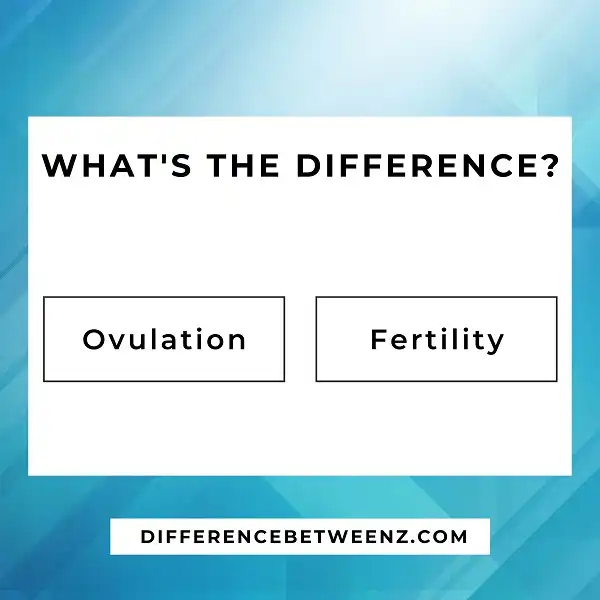When you are trying to conceive, it is important to understand the difference between ovulation and fertility. Ovulation is when your body releases an egg from one of your ovaries. Fertility, on the other hand, is a measure of how likely you are to get pregnant. For most couples, ovulation is the time when they are most fertile. However, there are things you can do to increase your chances of getting pregnant even after ovulation has occurred. By understanding the difference between ovulation and fertility, you can be better prepared for conceiving a baby.
What is Ovulation?
Ovulation is the release of a mature egg from the ovary. It normally occurs about halfway through a woman’s menstrual cycle, or around day 14 of a 28-day cycle. Ovulation is triggered by a rise in levels of LH (luteinizing hormone). This causes the follicle, which contains the egg, to rupture and release the egg into the fallopian tube. The egg then travels down the fallopian tube towards the uterus, where it may be fertilized by sperm. If fertilization does not occur, the egg is eventually shed during menstruation.
Ovulation is essential for fertility, as it provides the egg that can be fertilized by sperm and result in pregnancy. Ovulation typically occurs on a regular basis, but it can occasionally be irregular or even stop altogether. irregularities in ovulation are one of the most common causes of infertility. Ovulation can be affected by numerous factors, including stress, diet, illness, and certain medications. Therefore, if you are trying to conceive, it is important to track your ovulation and consult with your doctor if you have any concerns.
What is Fertility?
Fertility refers to the natural ability to conceive and give birth. It is often used as a general term to describe the ability to have children, but it can also be used more specifically to refer to the likelihood of conceiving or miscarrying. Fertility can be affected by a number of factors, including age, health, lifestyle choices, and environmental factors. In general, fertility declines with age, and women are more likely to experience fertility problems than men. Fertility can also be reduced by certain health conditions, such as endometriosis or polycystic ovary syndrome.
Lifestyle choices, such as smoking or frequently changing sexual partners, can also impact fertility. And finally, exposure to certain environmental toxins, such as lead or mercury, can also reduce fertility. Although there are a number of factors that can influence fertility, it is still possible to have children at any age. Fertility treatments, such as in-vitro fertilization, can help many couples conceive even when fertility is low.
Difference between Ovulation and Fertility
- Ovulation is the release of an egg from one of the ovaries. The egg then travels down the fallopian tube where it may be fertilized by sperm. Fertility is the ability to conceive and carry a pregnancy to term. Ovulation and fertility are often used interchangeably, but they are not the same thing. Ovulation is a necessary but not sufficient condition for fertility. A woman can ovulate without being fertile, and a woman who is not ovulating can still be fertile. Age, lifestyle choices, underlying medical conditions, and other factors can impact both ovulation and fertility.
- For this reason, it is important to consult with a healthcare provider if you are having difficulty conceiving. All couples should try to conceive for one year before seeking fertility evaluation and treatment. If you are over 35 years old, you should seek fertility evaluation and treatment after six months of trying to conceive without success. Ovulation predictor kits or charting your basal body temperature can help you determine if and when you are ovulating. Fertility testing may involve pelvic exams, blood tests, sperm analysis, or other procedures to determine if there are any underlying causes of infertility.
- Treatment for infertility may include medication, surgery, assisted reproductive technology (ART), or lifestyle changes. With modern fertility treatments, most couples will be able to conceive even if they have difficulty doing so naturally. Ovulation involves the release of an egg from one of the ovaries while fertility involves the ability to conceive carrying a pregnancy till childbirth with that egg fecundated by sperm outside or inside the womb through intercourse or other methods like IVF.
Conclusion
Ovulation and fertility are different things. While ovulation is the process of releasing an egg, fertility is the ability to get pregnant. Many women think that they are infertile when they are not ovulating, but this is not always the case. There are many ways to improve your fertility, even if you are not ovulating regularly. If you have been trying to conceive for a while and have not had any success, it may be worth talking to your doctor about your fertility.


